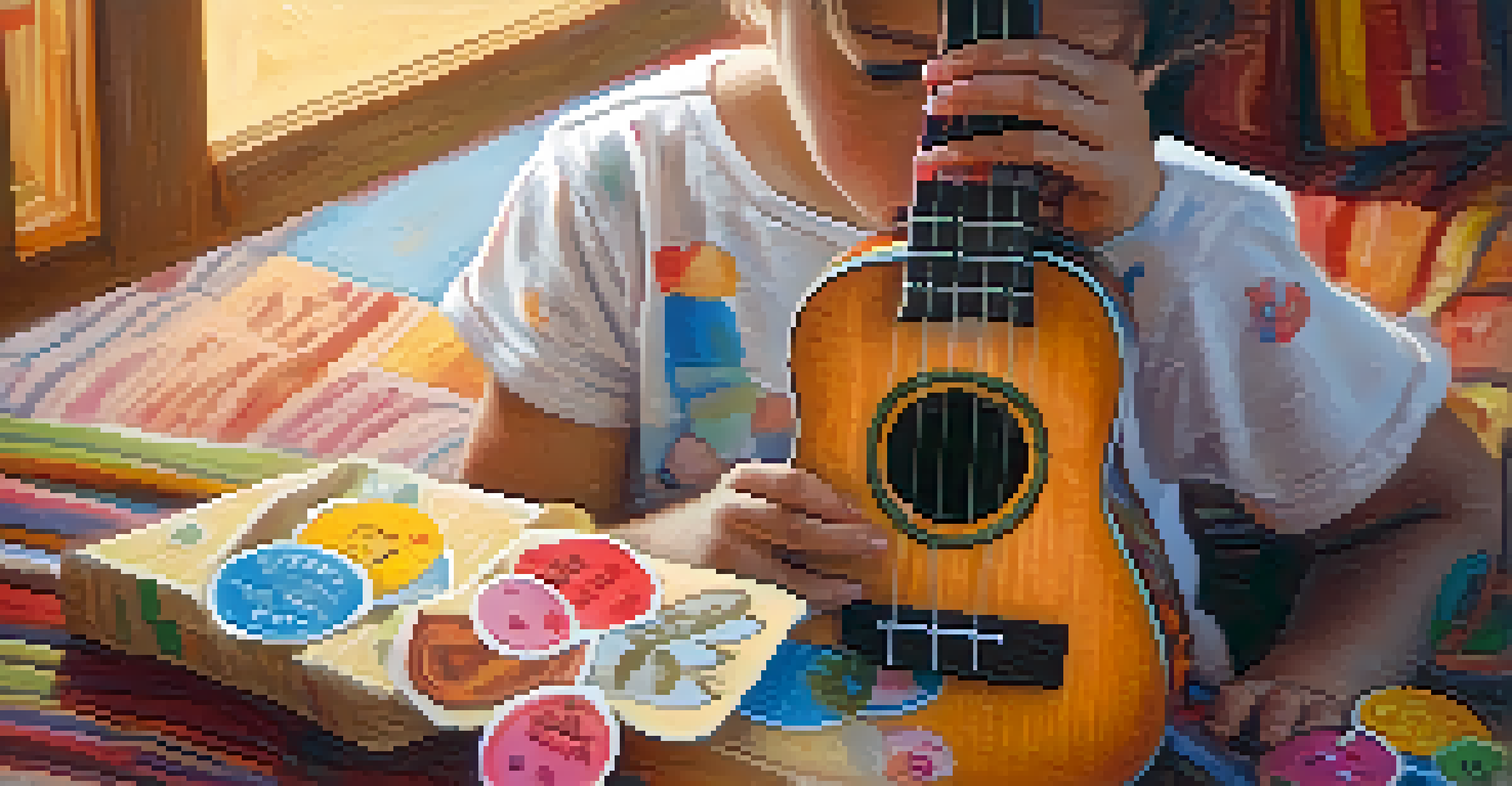Exploring the Benefits of Ukulele in Youth Music Programs

Why the Ukulele is Ideal for Young Musicians
The ukulele is a fantastic instrument for young musicians due to its size, weight, and ease of play. Its small, lightweight design allows kids to handle it comfortably, making the learning process less intimidating. Unlike larger string instruments, the ukulele has only four nylon strings, which are easier on small fingers and help build confidence quickly.
Music can change the world because it can change people.
Additionally, the ukulele's relatively simple chord structures enable beginners to start strumming songs within just a few lessons. This immediate gratification can be incredibly motivating, encouraging kids to practice more and develop a love for music. As they progress, they can explore more complex techniques and styles, ensuring a rich musical journey.
Furthermore, the ukulele's cheerful sound and versatility make it an appealing choice for various musical genres. Whether it's pop, folk, or traditional Hawaiian music, kids can experiment with different styles, fostering creativity and self-expression as they learn.
Enhancing Cognitive Skills Through Music
Engaging with music, particularly through instruments like the ukulele, can significantly enhance cognitive skills in children. Learning to play music involves reading notes, understanding rhythms, and coordinating movements, all of which stimulate brain development. In fact, studies suggest that musical training can improve memory, attention, and problem-solving abilities.

Playing the ukulele also encourages the development of fine motor skills. As children practice finger placements and strumming patterns, they refine their hand-eye coordination and dexterity. These skills are essential not just for music but also for everyday tasks like writing and typing, demonstrating the far-reaching benefits of musical education.
Ukulele: Perfect for Young Learners
The ukulele's small size and simple chord structures make it an ideal instrument for children, helping them build confidence and enjoy music quickly.
Moreover, music education fosters essential life skills, such as discipline and perseverance. Learning to play an instrument requires regular practice and patience, teaching children the value of dedication and hard work. These lessons extend beyond music, equipping young people with the tools they need to tackle challenges in various aspects of their lives.
Building Social Connections Through Group Play
One of the most rewarding aspects of participating in youth music programs is the opportunity to build social connections. Playing the ukulele in a group setting encourages teamwork and collaboration, as children learn to play together and harmonize. This communal experience not only makes learning fun but also fosters friendships among peers.
The beautiful thing about learning is that no one can take it away from you.
Group ukulele lessons or ensemble performances provide a sense of belonging, which is especially important during formative years. As kids navigate social dynamics, music serves as a common ground, breaking down barriers and helping them connect on a deeper level. These shared experiences can lead to lasting friendships built on a passion for music.
Additionally, performing together in front of an audience can boost children's confidence and public speaking skills. The supportive environment of a music group allows them to take risks and express themselves, preparing them for future challenges in social and professional settings.
Fostering Emotional Well-Being with Music
Music has a profound impact on emotional well-being, and the ukulele is no exception. Strumming a few chords can be a great way for kids to express their feelings, whether they're happy, sad, or everything in between. This emotional outlet can be particularly beneficial during stressful times, providing a healthy way to process and release emotions.
Moreover, participating in music programs can help children develop resilience. As they face challenges while learning new songs or techniques, they learn to cope with frustration and setbacks. This process teaches them that perseverance pays off, an important life lesson that extends beyond music.
Music Boosts Cognitive Skills
Playing the ukulele enhances children's cognitive abilities, fine motor skills, and instills important life lessons like discipline and perseverance.
The ukulele's light-hearted sound can also uplift spirits and create a positive atmosphere. Whether it's a casual jam session with friends or a structured class, the joy of making music together can foster a sense of happiness and well-being in young musicians.
Encouraging Creativity and Self-Expression
The ukulele is a gateway for children to explore their creativity and express themselves musically. With its simple chord structures, kids can easily create their own songs, allowing them to share their thoughts and feelings in a unique way. This form of self-expression is crucial for personal development, helping them discover their identity and voice.
Writing songs or composing music on the ukulele encourages imaginative thinking. Kids learn to think outside the box, exploring different melodies and lyrics as they craft their pieces. This creative process not only enhances their musical skills but also nurtures critical thinking and problem-solving abilities.
Furthermore, the act of performing their original compositions can boost self-esteem. Sharing their creations with others provides a platform for recognition and feedback, empowering kids to embrace their creativity fully. This confidence can carry over into other areas of their lives, inspiring them to take risks and explore new interests.
Supportive Learning Environment in Music Programs
Youth music programs that incorporate the ukulele often cultivate a supportive and inclusive learning environment. Instructors typically emphasize encouragement and collaboration, creating a space where kids feel safe to express themselves and make mistakes. This nurturing atmosphere is essential for building a love of music and lifelong learning.
As children work together in these programs, they develop social skills such as empathy and respect for others. Learning to listen to their peers and provide constructive feedback fosters a sense of community and belonging. This supportive framework not only enhances musical skills but also promotes positive social interactions.
Fostering Creativity and Connection
Ukulele programs encourage creativity, self-expression, and social connections among young musicians, creating a supportive community for learning.
Moreover, such environments often celebrate diversity in musical styles and backgrounds. By exposing kids to a variety of musical traditions, they learn to appreciate different cultures and perspectives. This understanding fosters open-mindedness, which is vital in our increasingly interconnected world.
Incorporating Technology for Enhanced Learning
In today's digital age, integrating technology into youth music programs can significantly enhance the learning experience. Various apps and online resources are available to help ukulele players of all levels learn new songs and techniques. These tools provide interactive and engaging ways for kids to practice and develop their skills outside the classroom.
Additionally, online platforms can connect young musicians with instructors and peers from around the globe. This access to a wider community allows them to share their progress, seek advice, and collaborate on projects, enriching their musical journey. Such connectivity can inspire creativity and motivate students to pursue their passion further.

Furthermore, technology can facilitate recording and sharing performances. Kids can easily document their progress and share their musical achievements with family and friends, providing a sense of accomplishment. This blend of traditional music education with modern technology creates a dynamic learning environment that resonates with today’s youth.